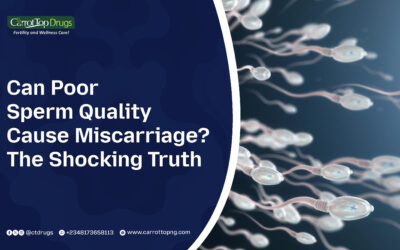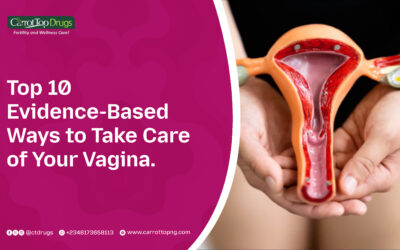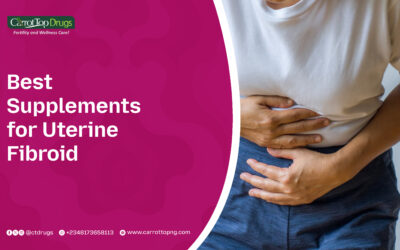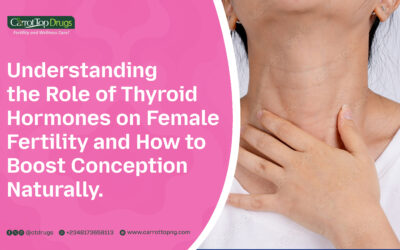Introduction
Omega-3 fatty acids are essential nutrients that play a vital role in overall health, particularly in cardiovascular function, brain health, and inflammation regulation. In recent years, their importance in reproductive health has also been highlighted, with growing evidence suggesting that omega-3 fatty acids can significantly influence fertility in both men and women. The role of omega-3 fatty acids in fertility is multifaceted, impacting everything from hormone production to sperm quality and embryo development. Understanding how these essential fats contribute to reproductive health can offer valuable insights for couples looking to optimize their chances of conceiving.
Statistics of Omega-3 Fatty Acids Infertility in Couples
Numerous studies have investigated the relationship between omega-3 fatty acids and fertility, with compelling evidence that omega-3 deficiency may contribute to infertility. Research indicates that couples with higher intake of omega-3 fatty acids have better reproductive outcomes. For instance, a study published in the Journal of Clinical Endocrinology & Metabolism found that women who take omega-3 supplement had greater likelihood of conceiving compared to those with lower levels. Omega-3 fatty acids also improve male fertility. In a study by Safarinejad et al, higher dietary intake of omega-3s has been associated with improved sperm quality, including increased sperm count and motility.
Causes of Omega-3 Fatty Acids Deficiency and Its Impact on Fertility
- Poor Dietary Intake:
One of the most common causes of omega-3 fatty acid deficiency is an inadequate intake of omega-3-rich foods. Omega-3 fatty acids are primarily found in fatty fish, such as salmon, mackerel, and sardines, as well as in flaxseeds, walnuts, and chia seeds. However, many people do not consume these foods regularly, leading to insufficient levels of omega-3s in the body. This deficiency can disrupt reproductive health by affecting hormone levels, egg quality, and sperm function, ultimately reducing fertility.
- Imbalance of Omega-6 to Omega-3 Ratios:
The modern Western diet is typically high in omega-6 fatty acids, found in processed foods, vegetable oils, and fried foods. While omega-6 fatty acids are also essential, an excessive intake relative to omega-3s can lead to an imbalance that promotes inflammation. Chronic inflammation has been linked to a variety of reproductive issues, including polycystic ovary syndrome (PCOS) in women and reduced sperm quality in men. Balancing the intake of omega-6 and omega-3 fatty acids is crucial for maintaining a healthy inflammatory response and supporting fertility.
- Health Conditions and Lifestyle Factors:
Certain health conditions and lifestyle factors can also contribute to omega-3 fatty acid deficiency. For example, individuals with malabsorption disorders, such as Crohn’s disease or celiac disease, may have difficulty absorbing fats, including omega-3s. Additionally, high levels of stress and chronic illness can increase the body’s demand for omega-3s, further depleting these essential nutrients. Smoking, excessive alcohol consumption, and a sedentary lifestyle can also negatively impact omega-3 levels, exacerbating their deficiency and impairing reproductive health.
Signs and Symptoms of Omega-3 Fatty Acids Deficiency in Men and Women
Omega-3 fatty acids play a crucial role in maintaining various aspects of health, and their deficiency can manifest in several ways, particularly in the context of reproductive health.
- Dry Skin and Hair:
Omega-3 fatty acids are vital for maintaining healthy skin and hair. A deficiency can lead to dry, flaky skin and brittle hair in both men and women. These symptoms may indicate that the body is not receiving enough omega-3s, which can also affect the health of reproductive tissues, such as the ovaries and testes.
- Mood Disorders and Cognitive Impairment:
Omega-3 fatty acids are essential for brain function and mental health. A deficiency can contribute to mood disorders, such as depression and anxiety, which can, in turn, impact fertility. Women with mood disorders may experience irregular menstrual cycles, while men may suffer from reduced libido and sexual performance, further complicating efforts to conceive.
- Joint Pain and Stiffness:
Omega-3 fatty acids have anti-inflammatory properties that help maintain joint health. A deficiency can lead to increased inflammation, resulting in joint pain and stiffness. This can affect overall physical well-being and may contribute to stress and discomfort, which can negatively impact reproductive health.
Impact of Omega-3 Fatty Acids Deficiency on Fertility
- Hormonal Imbalances:
Omega-3 fatty acids are integral to the production and regulation of hormones, including those critical for reproductive health. In women, omega-3 deficiency can disrupt the balance of estrogen and progesterone, leading to irregular menstrual cycles, anovulation, and difficulties in maintaining a healthy pregnancy. Low levels of omega-3 in men can affect testosterone production, which is essential for sperm development and overall fertility.
- Poor Egg Quality and Ovarian Function:
In women, omega-3 fatty acids are crucial for maintaining healthy ovarian function and egg quality. A deficiency can lead to oxidative stress, which damages the eggs and reduces their viability. Poor egg quality is a significant factor in infertility, as it can lead to unsuccessful fertilization or implantation, increasing the risk of miscarriage.
- Reduced Sperm Quality:
Omega-3 fatty acids are important for sperm membrane fluidity, which is essential for sperm motility and the ability to penetrate the egg. A deficiency in omega-3s can result in poor sperm morphology, reduced motility, and lower sperm count, all of which can significantly impair male fertility. Ensuring adequate omega-3 intake is therefore crucial for men who are trying to conceive.
How to Improve Fertility Naturally with Omega-3 Fatty Acids
- Dietary Modifications:
Incorporating omega-3-rich foods into the diet is one of the most effective ways to improve fertility naturally. Couples trying to conceive should aim to include fatty fish, such as salmon, mackerel, and sardines, in their weekly meals. Additionally, plant-based sources of omega-3s, such as flaxseeds, chia seeds, and walnuts, can be valuable additions to the diet. These foods provide essential nutrients that support reproductive health, including the regulation of hormones and the improvement of egg and sperm quality.
- Balancing Omega-6 and Omega-3 Intake:
As previously mentioned, the balance between omega-6 and omega-3 fatty acids is critical for reducing inflammation and supporting fertility. Couples should strive to reduce their intake of omega-6-rich foods, such as processed snacks and fried foods, while increasing their consumption of omega-3-rich foods. This balance can help modulate inflammation, improve hormonal function, and enhance overall reproductive health.
- Supplementation:
For individuals who may not be able to obtain sufficient omega-3s through diet alone, supplementation can be an effective strategy. Omega-3 supplements, particularly those containing EPA (eicosapentaenoic acid) and DHA (docosahexaenoic acid), are widely available and can help ensure that couples meet their daily requirements.
It is important to choose high-quality supplements that are free from contaminants. We recommend Evergreen Natal Care Plus Omega-3 for pregnant women due to the high demand in pregnant women.
The consumption of fish is not sufficient to meet the daily requirement of omega-3 fatty acids, hence the need to take supplements like Evergreen Omega-3 Fatty Acids.
Sources of Omega-3 Fatty Acids
- Fatty Fish: Salmon, mackerel, sardines, and anchovies are among the best sources of omega-3 fatty acids.
- Flaxseeds: Ground flaxseeds and flaxseed oil are rich in ALA (alpha-linolenic acid), a plant-based omega-3 fatty acid.
- Chia Seeds: Chia seeds are another excellent plant-based source of ALA.
- Walnuts: Walnuts are a convenient and nutritious source of omega-3 fatty acids.
- Algal Oil: For those following a vegetarian or vegan diet, algal oil derived from algae is a good source of DHA.
RDA for Omega-3 Fatty Acids
The recommended daily allowance (RDA) for omega-3 fatty acids varies depending on age, sex, and health status. For a healthy heart, experts generally recommend an intake of at least 250 to 500 mg of EPA and DHA combined per day. Women who are pregnant or trying to conceive may benefit from higher intakes, closer to 1,000 mg, while men should aim for a similar range to support sperm quality and overall reproductive health.
Omega-3 Fatty Acids Supplement
Omega-3 supplements are widely available in various forms, including fish oil capsules, krill oil, and algal oil for vegetarians and vegans. These supplements typically contain EPA and DHA, the most bioavailable forms of omega-3 fatty acids. It is important to select high-quality supplements that have been tested for purity and potency. The dosage may vary depending on individual needs, but a common recommendation is 1,000 to 2,000 mg of combined EPA and DHA per day for those looking to improve fertility.
Conclusion
The role of omega-3 fatty acids in fertility cannot be overstated. These essential fats are crucial for maintaining hormonal balance, supporting egg and sperm quality, and reducing inflammation, all of which are vital for successful conception and pregnancy. Couples struggling with infertility should consider evaluating their omega-3 intake and making necessary dietary adjustments or taking supplements to optimize their reproductive health. By ensuring adequate levels of omega-3 fatty acids, couples can improve their chances of conceiving and achieving a healthy pregnancy.
FAQs
- What is the role of omega-3 fatty acids in fertility? Omega-3 fatty acids help regulate hormones, improve egg and sperm quality, and reduce inflammation, all of which are crucial for fertility.
- Can omega-3 deficiency affect fertility? Yes, omega-3 deficiency can lead to hormonal imbalances, poor egg and sperm quality, and increased inflammation, all of which can impair fertility.
- How can I increase my omega-3 intake? You can increase your omega-3 intake by eating more fatty fish, flaxseeds, chia seeds, and walnuts, or by taking omega-3 supplements.
- What is the recommended daily allowance (RDA) of omega-3 fatty acids for fertility? The RDA for fertility is generally 500 to 1,000 mg of combined EPA and DHA per day, depending on individual needs and health status.
















